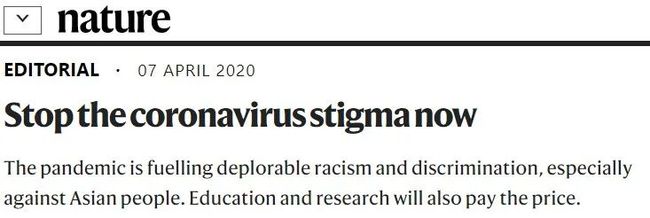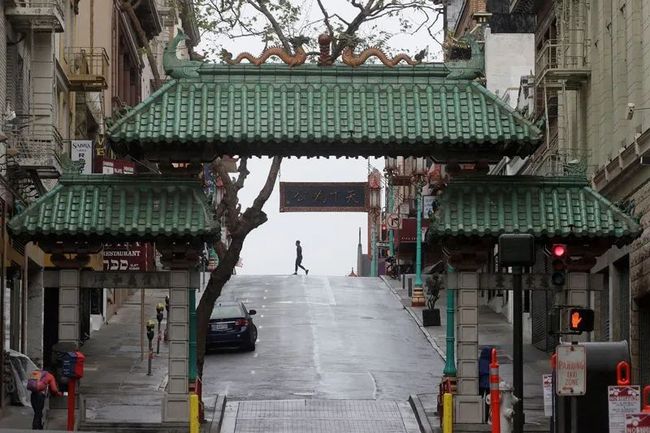《自然》杂志致歉:曾将病毒与武汉关联,愿为此担责
4月7日,《自然》杂志在题为“停止冠状病毒污名化刻不容缓”的社论文章中表示,这场疫情大流行助长了可悲的种族主义和歧视,尤其是针对亚洲人的歧视。教育和研究将为此付出代价。
该社论还就此前《自然》新闻报道中将新冠病毒与武汉和中国联系在一起致歉。
Nature, one of the world's top scientific journals, issued an editorial on Tuesday apologizing for associating the novel coronavirus with Wuhan and China in its news coverage.
以下为社论内容:
When the World Health Organization (WHO) announced in February that the disease caused by the new coronavirus would be called COVID19, the name was quickly adopted by organizations involved in communicating public-health information.
今年2月,世卫组织宣布将新型冠状病毒引起的疾病命名为“COVID19”,这一名字很快便被传播公共卫生信息的大小组织采用。
As well as naming the illness, the WHO was implicitly sending a reminder to those who had erroneously been associating the virus with Wuhan and with China in their news coverage— includingNature. That we did so was an error on our part, for which we take responsibility and apologize.
世卫组织在提出这个命名的时候,委婉地提醒了一下曾经在新闻报道中错误地将新冠病毒与武汉和中国关联在一起的人和组织,包括《自然》。我们当初的做法确实有误,我们愿为此承担责任并道歉。
For years, it was common for viral diseases to be associated with the landscapes, places or regions where the first outbreaks occurred — as in Middle East respiratory syndrome, or Zika virus, named after a forest in Uganda.
多年来,人们经常会将病毒性疾病与疫情首先暴发的地区、地点或区域关联在一起,比如中东呼吸综合征或寨卡病毒——以乌干达的一片森林命名。
Butin 2015, the WHO introduced guidelines to stop this practice and thereby reduce stigma and negative impacts such as fear or anger directed towards those regions or their people. The guidelines underlined the point that viruses infect all humans: when an outbreak happens, everyone is at risk, regardless of who they are or where they are from.
但是,世卫组织在2015年发布指引,要求停止这种做法,以减少污名化和恶劣影响,比如对所涉区域或当地民众的恐惧或愤怒之情。指引中强调,病毒会感染所有人类:一旦发生疫情,所有人都有风险,无论他们是谁,无论他们来自哪里。
And yet, as countries struggle to control the spread of the new coronavirus, a minority of politicians are sticking with the outdated script.
但是,在各国努力控制新冠病毒传播之际,少数政客却依然抱守旧辞不放。
US President Donald Trump has repeatedly associated the virus with China. Brazilian lawmaker Eduardo Bolsonaro — the son of President Jair Bolsonaro — hascalled it “China’s fault”. Politicians elsewhere, including in the United Kingdom, are also saying that China bears responsibility.
美国总统特朗普一再将新冠病毒与中国关联在一起,巴西总统博索纳罗之子、巴西众议员爱德华多称新冠肺炎疫情是“中国的错”。其他地区的政客,包括英国在内,也在说中国应为此负责。
Continuing to associate a virus and the disease it causes with a specific place is irresponsible and needs to stop.
执意将一种病毒及其所致疾病与某个地方关联在一起,是一种不负责任的行为,需要立即停止。
As infectious-disease epidemiologist Adam Kucharski reminds us in his timely bookThe Rules of Contagion, published in February, history tells us that pandemics lead to communities being stigmatized, which is why we all need to exercise more care.If in doubt, seek advice, and always fall back on the consensus of the evidence.
传染病流行病学家Adam Kucharski在他2月出版的应时之作《传染的规则》中这样提醒我们:历史表明,大流行会导致一些群体被污名化,这就是为什么我们所有人都要谨言慎行。如果存有疑问,可以征求他人意见,但无论如何,一定要落到实实在在的证据上。
美国加利福尼亚州旧金山市新冠疫情期间的唐人街 图源:美联社
种族主义攻击
Racist attacks
Failing to do so has consequences. It's clear that since the outbreak was first reported, people of Asian descent around the world have been subjected to racist attacks, with untold human costs — for example, on their health and livelihoods.
做不到这一点会造成严重后果。显而易见的是,自从新冠肺炎疫情暴发以来,世界各地的亚裔成为了种族主义攻击的对象,很多人付出了极大的代价,包括对他们身心健康和谋生方式造成的损失。
Law-enforcement agencies say they are making investigation of hate crimes a high priority, but such inquiries might come too late for some, including many of the more than 700,000 Chinese undergraduate, master’s and PhD students studying at universities outside China. The majority are in Australia, the United Kingdom and the United States.Many have returned home while their institutions are closed owing to lockdowns, and many might not return.
执法机构表示正在重点调查仇恨犯罪,但是这些行动对于一些人来说可能为时已晚——包括70多万在海外学习的中国本科生、硕士生和博士生中的大部分人。中国留学生主要集中在澳大利亚、英国和美国,许多学生在学校关闭后已经陆续返回中国,但是也有许多没有回国。
Students are hesitating to come back, in part because of fears of continuing racism, along with uncertainty over the future of theircourses and not knowing when international travel will resume.
关于是否要回国,这些学生左右为难:一方面害怕继续遭受种族歧视,一方面担心未来学业的不确定性,加上国际航班的恢复时间也未知。
These young people will experience disruption and the loss of new connections and opportunities. But the loss of students from China and other countries in Asia has wide-ranging -and worrying implications for the scholarly enterprise, too.
这些年轻学子的学业被打断,失去了刚刚建立的关系和机会;而损失来自中国和亚洲其他国家的学生,也会给高校院所带来令人担忧的深远影响。
It means that universities in the affected countries will become less diverse — something that has not happened for generations.
它意味着受影响国家的高校将面临多样性的下降——这在几代人中从未发生过。
一损俱损
A loss for all
For decades, campuses have striven to boost diversity, and countries have enacted policies to encourage international academic mobility.
几十年来,各个学校一直在努力提高多样性,各个国家也在制定政策鼓励国际学术流动性。
Diversity is valuable for its own sake. It encourages understanding and dialogue between cultures, and sharing of points of view and ways of being. And it has always been a fuel for research and innovation.
多样性的价值不言而喻。它鼓励不同文化之间的理解和对话,鼓励共享不同的观点和存在方式,而且始终是推动研究和创新的动力。
Moreover, a diverse campus body is needed to improve policies and structures so that universities — and research publishing — can become more welcoming.
不仅如此,一个多样性的校园也是改进政策和体制所必不可少的,只有这样,才能让高校——以及研究成果发表——变得更友好。
Many barriers to diversity remain: in the April issue ofNature Reviews Physics, for example, researchers and science communicators from China, India, Japan and South Korea report examples of discrimination and other factors that prevent them being heard in international journals (S. Hanasogeet al. Nature Rev. Phys.2, 178–180; 2020).
通向多样性之路依然道阻且长:在《自然综述:物理》的4月刊中,来自中国、印度、日本和韩国的科研人员和科学传播人士用亲身实例讲述了歧视和其他因素如何阻止他们在国际期刊上发声(S. Hanasoge et al. Nature Rev. Phys.2 , 178–180; 2020)。
Many leaders want to listen to and act on expert scientific advice to deal with this pandemic and save lives.
许多领导人都希望听取专家的科学意见,据此采取行动应对新冠病毒大流行,挽救生命。
On terminology, the advice is clear: we must all do everything we can to avoid and reduce stigma; not associate COVID-19 with particular groups of people or places; and emphasize that viruses do not discriminate — we are all at risk.
在术语方面,来自专家的意见很明确:我们必须竭尽所能地避免和减少污名化;不要把COVID-19和特定的人群或地方相提并论;病毒不会歧视——我们所有人都有风险。
It would be tragic if stigma, fuelled by the coronavirus, led Asia’s young people to retreat from international campuses, curtailing their own education, reducing their own and others’ opportunities and leaving research worse off — just when the world is relying on it to find a way out.
如果新冠病毒引起的污名化导致亚洲年轻人离开国际校园,缩短教育时间,放弃自己和他人的机会,让科研环境每况愈下——在这个世界依赖科研寻求出路之际,将不啻为一个悲剧。
Coronavirus stigma must stop — now.
新冠病毒污名化必须停止——刻不容缓。
Notes
停止污名
stop stigma
抱守旧辞
stickwithoutdated script
种族主义攻击
racist attacks
歧视
discrimination
促进多样性
boost diversity
学术流动性
academic mobility
一损俱损
a loss for all
处于危险之中
at risk
每况愈下
worse off
编辑:陈月华
来源:《自然》 中国日报客户端
本文内容转载自:中国日报双语新闻,已获授权













